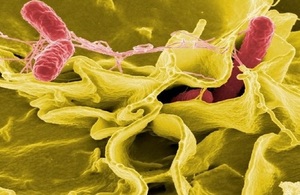Rise in cases of Salmonella Typhimurium
PHE and the FSA are working together to inform the public about the measures they can take to avoid infection with Salmonella Typhimurium.

Food Standards Agency, Food Standards Scotland, Public Health England and Health Protection Scotland are reminding people to take care when handling raw meat and to cook it properly.
This comes as we investigate a rise in cases of a particular strain of Salmonella Typhimurium which have been linked to lamb and mutton. We first saw an increase in cases of this particular type of salmonella in July 2017. A number of control measures were put into place which led to a significant decline in cases at the end of that year. A total of 118 cases were reported up until May 2018.
Since June 2018, a further 165 cases have been reported (up to 19 October), which led us to put control measures in place. These haven’t led to the same decline in cases as in 2017 and so we are now reminding the public about how to cook and handle raw meat.
Nick Phin, Deputy Director, National Infection Service, PHE said:
The likely cause of the increased numbers of this specific strain of Salmonella Typhimurium is considered to be meat or cross-contamination with meat from affected sheep.
People can be infected with Salmonella Typhimurium in a number of ways such as not cooking their meat properly, not washing hands thoroughly after handling raw meat, or through cross-contamination with other food, surfaces, and utensils in the kitchen.
Background
- Symptoms of Salmonella infection include diarrhoea, vomiting, abdominal pain and fever.
- Prior to July 2017 only 2 cases of this strain (Single Nucleotide Polymorphism address 1.43.67.992.2703.3225. %) had been detected in England.
- Between July 2017 and November 2017, the first increase in this strain was observed with 95 cases reported in England, Scotland and Wales. Control measures were implemented which resulted in a decline in cases.
- Numbers of cases were at low levels from December 2017 to June 2018 (23 cases during this period).
- In June 2018, the numbers of cases increased again and since June 2018 165 cases have been reported.
- There was a death in which salmonella was thought to be a contributory factor related to this outbreak last year, but we are not aware of any deaths related to this strain in 2018.